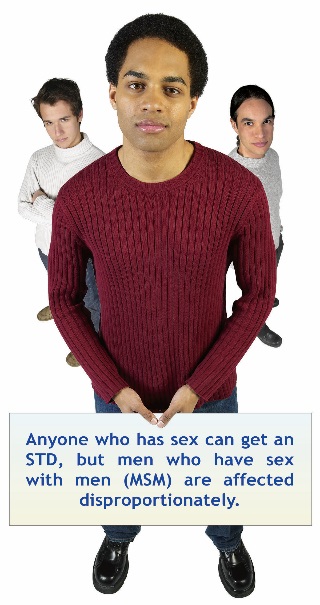Stakeholder Analysis MSM Online Survey
Generic Clearance for the Collection of Qualitative Feedback on Agency Service Delivery (NCHHSTP)
Att2 Stakeholder Analysis MSM Survey 23JUL2015
MSM AYA Stakeholder Analysis Survey
OMB: 0920-1027
Form Approved
OMB No. 0920-1027
Expiration Date: 08/31/2017
Attachment 2: Stakeholder Analysis MSM Online Survey
Public reporting burden of this collection of information is estimated to average 10 minutes per response, including the time for reviewing instructions, searching existing data sources, gathering and maintaining the data needed, and completing and reviewing the collection of information. An agency may not conduct or sponsor, and a person is not required to respond to a collection of information unless it displays a currently valid OMB control number. Send comments regarding this burden estimate or any other aspect of this collection of information, including suggestions for reducing this burden to CDC/ATSDR Reports Clearance Officer; 1600 Clifton Road NE, MS D-74, Atlanta, Georgia 30333; Attn: OMB-PRA (0920-1027)
The goal of this survey is to gather feedback about current health information products to determine if they meet the needs of the public. We would like your feedback on informational materials produced by the Centers for Disease Control and Prevention (CDC). If you are a gay/bisexual man or have had sex with another man in the past 6 months, please help us by taking this online survey. This survey should take about 10 minutes to complete. A 7th grade reading level is required. If you have any questions about this survey, please contact James Bethea (jbethea@danya.com), who is in charge of this study.
The CDC is a federal public health agency that provides health information to the public as part of its mission to protect America from health, safety and security threats. This survey is sponsored by CDC’s Division of STD Prevention.
The CDC recognizes that your time is extremely valuable and appreciates your participation.
Please click here [insert link] to take this survey.
DSTDP Survey for Men who have Sex with Men (MSM)
Please choose the gender identity that best describes you.
Male
Female
Transgender
Prefer not to answer
Please indicate your age (in years).
15-17
18-22
23-25
25-30
31-40
41-50
51-60
61 and above
What is the highest level of education you have completed?
Less than high school
Some high school
High School Graduate
Some college
Trade/technical/vocational training
College graduate or more
Military
What is your race/ethnicity? (Please select all that apply)
American Indian or Alaska Native
Asian/Pacific Islander
Black or African American
White
Hispanic or Latino
Other
Prefer not to answer
If you wanted information about STDs from CDC, in what format would you like to receive this information? (Please select all that apply)
Website
Podcast
Video
Monthly newsletter
Text message
Printed fact sheet
Blog
Hotline
Social media
I do not want to receive STD information from CDC
Have you ever used any of the formats to learn about STDs from CDC (select all that apply)?
Website
Podcast
Video
Monthly newsletter
Text message
Printed fact sheet
Blog
Hotline
Social media
I have never looked for STD information from CDC
The next set of questions refers to images and text found on an actual CDC Fact Sheet about STDs.

Image 1
6. Imagine you saw image 1 on a fact sheet about STDs for gay and/or bisexual men. Would you say that this image is _______? (Please select all that apply)
Stereotypical
Is meant for people like me
Interesting
Stigmatizing
Attention-getting
Outdated
Offensive
7. How appropriate is this image for a fact sheet for gay and/or bisexual men?
1 2 3 4 5
Very Appropriate Appropriate Neutral Inappropriate Very Inappropriate

Image 2
8. Imagine you saw image 2 in a fact sheet about STDs for gay and/or bisexual men. Would you say that these images are _______? (Please select all that apply)
Stereotypical
Is meant for people like me
Interesting
Stigmatizing
Attention-getting
Outdated
Offensive
9. How appropriate is this image for a fact sheet for gay and/or bisexual men?
1 2 3 4 5
Very Appropriate Appropriate Neutral Inappropriate Very Inappropriate
The next questions relate to the following text from CDC’s Fact Sheet, “What Gay, Bisexual and Other Men Who Have Sex with Men Need to Know About Sexually Transmitted Diseases.”
The following topics
are discussed in this fact sheet.
What
are sexually transmitted diseases? Am
I at risk for STDs? How
are STDs spread? How
will I know if I have an STD? Can
STDs be treated? How
can I protect myself? Where
can I get more information?

10. If you were concerned that you or someone you know might have an STD, how critical would you rate the topics above?
1 2 3 4 5
Very Relevant Relevant Somewhat relevant Irrelevant Very irrelevant
11. Do these topics address your most important questions about STDs?
A. Yes
B. No
C. Not sure
12. If the above topics do not address your most important questions, what additional information would you like to see included:
A. Symptoms
B. STD Images that reflect real cases
C. Testimonials from people who have had a STD
D. How to get tested
E. Where to get tested
F. Symptom checker
G. Other
Gonorrhea is a sexually transmitted disease. The next set of questions refers to images and text found on a CDC Fact Sheet about gonorrhea.

Image 3
13. Imagine you saw image 3 on a fact sheet about gonorrhea. Would you say that these images are _______? (Please select all that apply)
Stereotypical
Is meant for people like me
Interesting
Stigmatizing
Attention-getting
Outdated
Offensive
14. How appropriate is this image for a fact sheet about gonorrhea?
1 2 3 4 5
Very Appropriate Appropriate Neutral Inappropriate Very Inappropriate

Image 4
15. Imagine you saw image 4 on a fact sheet about gonorrhea. Would you say that this image: is _______? (Please select all that apply)
Stereotypical
Is meant for people like me
Interesting
Stigmatizing
Attention-getting
Outdated
Offensive
16. How appropriate is this image for a fact sheet about gonorrhea?
1 2 3 4 5
Very Appropriate Appropriate Neutral Inappropriate Very Inappropriate
The next questions will be related to the following text from the CDC Fact Sheet, “Gonorrhea”.
How can I reduce
my risk of getting gonorrhea? The
only way to avoid STDs is to not have vaginal, anal, or oral sex. If
you are sexually active, you can do the following things to lower
your chances of getting gonorrhea: Being
in a long-term mutually monogamous relationship with a partner who
has been tested and has negative STD test results; Using
latex condoms and dental dams the right way every time you have
sex. Anyone
who is sexually active can get gonorrhea. Gonorrhea can cause very
serious complications when not treated, but can be cured with the
right medication.

18. Please rate how easy the text (above) is to understand.
1 2 3 4 5
Very Easy to understand Easy to understand Somewhat easy to understand Difficult to understand Very difficult to understand
19. If you or a partner were concerned about getting gonorrhea, how would helpful would you rate the information the above?
1 2 3 4 5
Very Helpful Helpful Somewhat Helpful A Little Helpful Not At All Helpful
20. After seeing the images and the text above, would you recommend the CDC’s Fact Sheets to your friends or others you know if they were looking for information about STDs?
Yes
No
Not sure
23. After completing this survey what actions would you take? (Select all that apply)
Visit the CDC website
Do an internet search about the campaign
Look for more information about STDs
If involved in a sexual relationship, talk to my partner about STDs
Talk to a doctor (or other provider) about STDs/testing
I wouldn’t take any specific action
Thank you for your feedback! Those are all the questions we have for you today. If you have any questions about the survey you just answered, please contact James Bethea (jbethea@danya.com), the Project Director for this study.
| File Type | application/vnd.openxmlformats-officedocument.wordprocessingml.document |
| Author | Ainka Gonzalez |
| File Modified | 0000-00-00 |
| File Created | 2021-01-27 |
© 2026 OMB.report | Privacy Policy